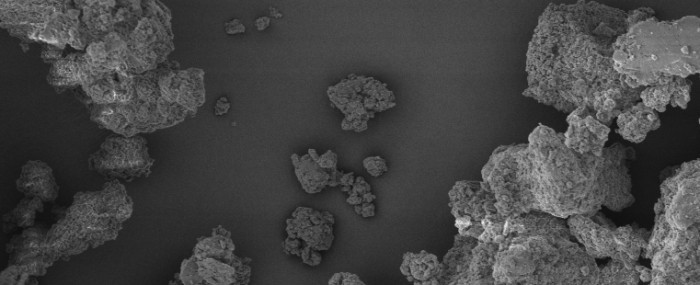
Startup makes omega-3 nanocapsules for food industry
29 de maio de 2018By Marcos de Oliveira | FAPESP Research for Innovation – Funcional Mikron, a startup based in Valinhos (São Paulo State, Brazil), has developed a process to produce omega-3 for direct human consumption and as an ingredient for the food industry. Omega-3 is a group of polyunsaturated fatty acids found in fish and seafood, as well as algae and other plants. It is taken as a food supplement to combat high levels of triglycerides and cholesterol or to avoid senile dementia.
The project was supported by FAPESP’s Innovative Research in Small Business Program (PIPE). Using nanotechnology, which involves the manipulation and manufacture of materials and devices on the atomic scale (a nanometer is a millionth of a millimeter), the firm developed a compound containing phytosterols, plant-derived substances structurally related to cholesterol and capable of combating excess cholesterol. Omega-3 nanoencapsulated with phytosterol is more efficiently absorbed by the organism and more effective at improving human health, according to the firm.
“We use fish oil encapsulated in micro- or nanostructures coated with phytosterols. They’re nanospheres of between 100 and 400 nanometers that are easily absorbed by the intestine and enter the bloodstream faster and in larger volumes,” says biomedical scientist Eduardo Caritá, a partner in Funcional Mikron and its director of technology and innovation.
In a test performed in partnership with the Federal University of São Paulo (UNIFESP) involving 30 volunteers, vitamin B nanoparticles nanoencapsulated in phytosterols were absorbed 25.7% better than vitamins in conventional capsules, showing better bioavailability of the product in the organism.
Caritá explains that the omega-3 and phytosterol nanosphere competes with low-density lipoprotein, familiar to almost everyone as LDL cholesterol, which is made by the liver when food is digested. Too much cholesterol in the blood triggers high levels of VLDL (very low-density lipoprotein). LDL and VLDL are often called “bad cholesterol” because they cause arterial wall inflammation that can lead to a heart attack.
The body prioritizes the absorption of phytosterol, a compound derived from plants and very similar to cholesterol in terms of molecular structure, in preference to the exogenous cholesterol produced when food is digested and expelled in the feces. The absorption of omega-3, whose active elements are two fatty acids, eicosapentaenoic acid (EPA) and docosahexaenoic acid (DHA), eventually reduces all inflammatory processes in the body, including those occurring in the arteries owing to a buildup of atheroma, a material that forms plaques made up mainly of calcium and fat, especially VLDL. Both omega-3 and phytosterols are considered functional foods by Brazil’s Ministry of Health and its National Health Surveillance Agency (ANVISA). Scientific research shows that they are beneficial to health when taken as food supplements rather than drugs.
The new production process could make Funcional Mikron the first Brazilian manufacturer of omega-3 in powder form for the food industry. “We’ll produce this ingredient for sale to other companies to use in ice cream, drinking chocolate, milk, juice, tea, and even bread and cake,” Caritá says.
Other benefits of this production process using nanotechnology include longer shelf life, he adds, and a lack of the unpleasant fish smell typical of conventional omega-3 capsules or powders. Final sensory tests to validate this property are currently being conducted.
Drugs and supplements
Funcional Mikron began operating in 2007 as a department of Ultrapan, a company that makes fruit juice and energy drinks such as Dr. Up and Power Bull in Valinhos, São Paulo State. It was spun off in 2017. It developed caffeine nanocapsules for Power Bull to facilitate absorption of the substance by the body. Both firms are part of the Káiros group, which comprises ten food processors led by Alibra, with plants in Campinas (São Paulo State) and Marechal Rondon (Paraná) that make milk mixtures and other compounds used as ingredients in pizzas, ice creams, sauces and bakery products. It also markets its own products directly, including drinking chocolate and baby cereal powder.
In 2015, the group took over Genkor, a Brazilian manufacturer of food dyes, thickeners and stabilizers. All these firms work together and can incorporate the technologies developed by Funcional Mikron, which with Ultrapan makes 102 ingredients for drugs or supplements such as iron, vitamins, minerals and nanoencapsulated caffeine. It mainly exports vitamin supplements to other Latin American countries.
“Once the last tests are completed, we’ll start producing nanoencapsulated omega-3 in Valinhos,” Caritá says. “This will require investment, as yet without a defined origin, in a US-made machine that costs about US$300,000.” The machine is an ultrahigh-pressure homogenizer that will be used to blend water, fish oil and phytosterol. The water will drive the oil into the phytosterol to form a nanoemulsion that will serve as the basis for the new products to be launched by Funcional Mikron in 2019.
Company: Funcional Mikron
Site: labnano@funcionalmikron.com.br
